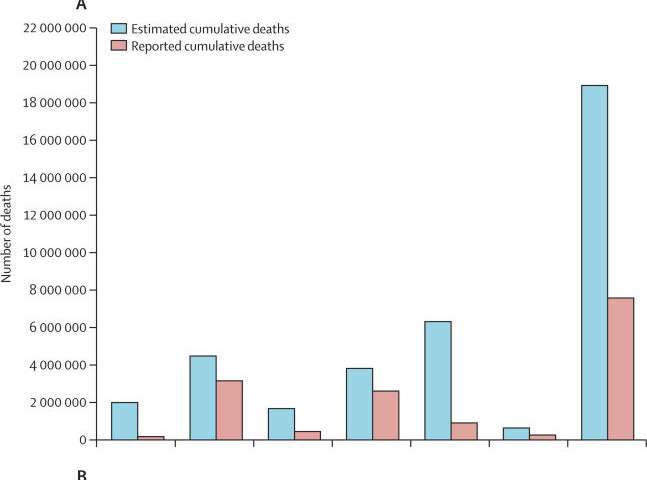Report details 'massive global failures' of pandemic response

Widespread, global failures in the COVID-19 response led to millions of preventable deaths and reversed progress made towards the UN Sustainable Development Goals (SDGs) in many countries, finds a new report involving UCL researchers.
"The Lancet COVID-19 Commission report," reviews evidence from the first two years of the pandemic and outlines recommendations on ending the pandemic and effectively managing future global health threats, alongside achieving long-term sustainable development.
The report is the result of two years' work from leading experts in public policy, international governance, epidemiology, vaccinology, economics, international finance, sustainability, and mental health.
It cites widespread failures of prevention, transparency, rationality, basic public health practice, and operational cooperation and international solidarity, that resulted in an estimated 17.7 million deaths.
Co-author, Professor Susan Michie (UCL Psychology & Language Sciences), formed part of the Public Health working group of the commission, who found that the failures were partly down to isolated and unequal national responses to COVID-19—featuring inconsistent public health advice and poor implementation of public health and social measures, such as wearing face masks and vaccination.
Professor Michie said: "We found that public policies failed to draw upon the behavioral and social sciences, which would have led to a more successful implementation of public health interventions and helped to increase social trust, pro-sociality, equity and well-being.
"As we continue to face this pandemic and prepare for the next, it is critical to appreciate and better understand the bottom-up and top-down processes in pandemic governance that encourage crucial prosocial behavior—including reducing transmission to others, supporting others to keep safe, promoting health and social care within and outside health care facilities, and promoting social cohesiveness.
"Human behavior is at the heart of pandemic transmission and suppression. However, to build health and safety cultures into societies, we need to ensure that people have the correct opportunities to do so. This includes ensuring easy access to vaccines, the financial resources needed to self-isolate and the wearing of face masks to be seen as normative."
To control the current pandemic and prepare to minimize the scale and harm of future pandemics, the Commission proposes that all countries adopt a vaccination-plus strategy, combining widespread vaccination with appropriate public health precautions and financial measures.
The report's recommendations include:
- Calls for WHO to have a substantial increase in funding and greater involvement from heads of state representing each region
- A new global pandemic agreement and an update of the International Health Regulations
- Increased and more effective investment for both pandemic preparedness and heath systems in developing countries
- Health-system strengthening implemented at a local level
- A long-term funding commitment of around $US60 billion (£53bn) each year, equivalent to 0.1% of the gross domestic product of high-income countries
- A 10-year effort by G20 countries to bolster research and development and investments in infrastructure and manufacturing capacity for all critical pandemic control tools, including testing, diagnostics, vaccines and treatments
- Support and training for health workers in low- and middle-income countries
- An expansion of the WHO Science Council to apply urgent scientific evidence for global health priorities
- Strengthening of WHO through the establishment of a WHO Global Health Board with representation of all six WHO regions
- Strengthening of national health systems on the foundations of public health and universal health coverage, grounded in human rights and gender equality
- An independent and transparent investigation into the origins of SARS-CoV-2, alongside robust regulations, to help prevent future pandemics and strengthen public trust in science and public authorities
Professor Jeffrey Sachs, chair of the commission and university professor at Columbia University, said: "The staggering human toll of the first two years of the COVID-19 pandemic is a profound tragedy and a massive societal failure at multiple levels.
"We must face hard truths—too many governments have failed to adhere to basic norms of institutional rationality and transparency; too many people have protested basic public health precautions, often influenced by misinformation; and too many nations have failed to promote global collaboration to control the pandemic."
He added: "Now is the time to take collective action that promotes public health and sustainable development to bring an end to the pandemic, addresses global health inequalities, protects the world against future pandemics, identifies the origins of the pandemic, and builds resilience for communities around the world.
"We have the scientific capabilities and economic resources to do this, but a resilient and sustainable recovery depends on strengthened multilateral cooperation, financing, biosafety, and international solidarity with the most vulnerable countries and people."
More information:
Jeffrey D Sachs et al, The Lancet Commission on lessons for the future from the COVID-19 pandemic, The Lancet (2022). DOI: 10.1016/S0140-6736(22)01585-9
Provided by University College London